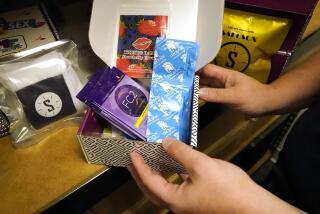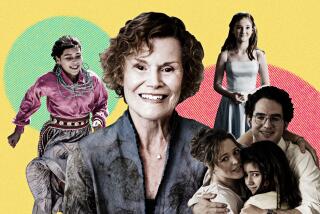Web Has Answers When Teens Start Asking About . . . You Know
- Share via
“Facts of life” talks are still a squirmy rite of passage for teens and parents. But let’s face it: There are some topics teenagers never broach with parents.
How to put on a condom properly? Is there such a thing as a G-spot? Do girls like slobbery kisses? What, exactly, is oral sex? What is normal dance-floor fondling?
Increasingly, though, teens and young adults are asking--and getting--instantaneous answers to these questions on the Internet, where a whole wide world of everything you ever wanted to know about sex but were afraid to ask is available with a point and click.
“We want to reach young people where they are, and for more and more of them, that means surfing the Net,” said Vicky Rideout, director of the Henry J. Kaiser Family Foundation’s Program on the Entertainment Media and Public Health, developers of https://www.itsyoursexlife.com. The site, written by doctors and reproductive researchers, features an interactive quiz that tests a user’s knowledge about the risk of contracting sexually transmitted diseases.
The site has interactive charts called “Know Your Birth Control Options,” which includes a section on contraceptive myths (such as preventing pregnancy by urinating or douching after sex).
Not everyone is a fan of sites imparting explicit information about sex. Dr. Laura Schlessinger has attacked Go Ask Alice!, a health education link on the American Library Assn.’s Web site (https://www.ala.org), as “pornography” available to children. Go Ask Alice! is a frank, comprehensive source of health and sex information maintained by Columbia University health educators that answers questions without pulling punches on everything from “how to tell a partner you are virgin” to bestiality.
The power and draw of Web sites such as these is that they are anonymous places where youths can get information without being conspicuous and that they are written in language easily comprehensible to Generation Y.
Teens still find it tremendously difficult to raise the subject of sex with parents, said Dr. Paula Adams Hillard, a professor in the department of gynecology and obstetrics at the University of Cincinnati College of Medicine. “The Web provides privacy and confidentiality, which teens really need,” she said. “I don’t believe girls have ever asked their mothers, ‘How do I know if I am ready to go all the way?’ But it is a really important question. Parents may just say, ‘Don’t do it.’ The good, reputable, medically accurate Web sites provide an invaluable service to youth. Knowledge really is power.”
Some critics worry, however, that offering knowledge is the same as offering encouragement. But numerous studies have instead linked sex education with more responsible sexual behavior by adolescents. “We would rather see people satisfy their curiosity with information rather than experimentation,” said Esther Drill, executive editor of gURL.com, a lively Web site (https://www.gurl.com) with all sorts of sardonic, anti-Seventeen magazine features like “The Boob Files” and “Looks Aren’t Everything.” Take this question, recently posted on the site’s “Help Me Heather” page: “I want to know if masturbation is bad. I am way too embarrassed to ask my parents.”
Heather McDonald, co-founder and creative director of gURL.com, responded reassuringly: “Hi. Masturbation is not bad. It is something that most girls are a little uncomfortable talking about. But you can be sure that many girls (and most of the human race!) are doing it.”
Birds & Bees is a weekly column on relationships and sexuality. Kathleen Kelleher can be reached via e-mail at kellehr@gte.net.






